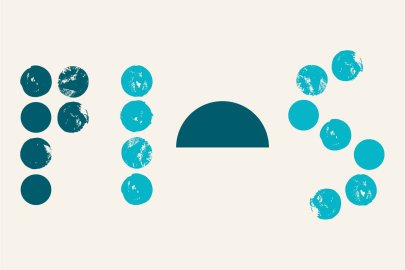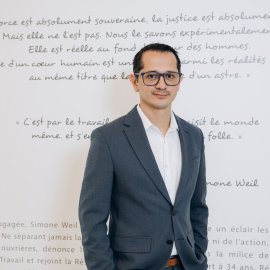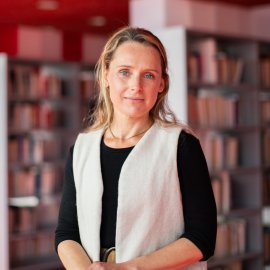Building on solid foundations and an innovative, renewed management format, the Institut d'études avancées de Nantes is celebrating its 15th anniversary this year. This is an ideal time to lay the foundations for a new scientific project.
By Luis Mora Rodriguez,
in collaboration with Pierre-Etienne Kenfack and Sophie Halart
May 2024
True to its reputation for excellence, the Institut has historically been interested in the foundations of societies and the possibility of questioning and dialoguing around these foundations. At the heart of this dialogue lies listening to and discussing with researchers from all disciplinary horizons, from all parts of the world, and particularly from the South.
As a result, the Institut is a place of academic freedom and the pollination of knowledge, which has enabled it to transform itself as an organization, opening up its scientific perspectives to new epistemological, political and societal challenges.
As part of its dynamic, the Institute remains committed to a fruitful dialogue between researchers from the South and those from the global "North". This commitment makes the Institute unique in Europe, and benefits from the city of Nantes' history of openness as a platform for exchange and cross-fertilization of perspectives on the world.
The ecumene, at the heart of the Institute's scientific project
As part of its evolutionary process, and in keeping with its mission, the Institut is building its new scientific project around the notion of the ecumene, as developed in the thought of Augustin Berque. This choice stems from the fact that the concerns weighing on the planet's future concern us all, and must be understood within the historical and subjective relationships that humans have, or are establishing, with the world.
The "environment" must be understood as a concrete reality, i.e. the reality as it appears to a concerned being. This perspective breaks with the idea that the milieu is a universal abstraction that is the intrinsic substance of the "environment".
It postulates that Western modernity has produced a major caesura between two spatio-temporal scales: lived time, whose measure is the experience of the body, and the objective world, where space and time can be measured ceaselessly, and whose dimensions escape human experience. An infinite, limitless world.
This is why the ecumene is conceived as a reality that cannot be exhausted or limited to the objective, universal terms of ecology, or to the phenomenological, particular and subjective terms of certain cultures. The "milieu" describes the relationships that a culture establishes with the surrounding world that gives it its foundation and meaning.
We need to take into account the history of the human group occupying a space that operates as a set of relationships. These relationships are woven with the resources, constraints and risks associated with human presence. Understanding and managing these relationships not only ensures the earth's habitability, but also the social bond between humans, as this bond unravels when the environment no longer makes sense.
Taking the "environment" into account is no longer an exclusively ecological concern, and has become an ontological, geographical and legal-political issue: geographical, in the sense that geography as the human writing (grapphê) of the Earth (Gê) is also the "terrestrial writing of the human" (Berque); legal-political, because it invites us to rethink and reorganize the relationships between human beings and nature.
The questions raised by the Institut d'études avancées de Nantes are at the heart of these issues, because they involve living and thinking differently about the world.
Epistemological concerns
This new perspective can then be broken down into a series of related epistemological concerns.
The question of the ecumene carries with it a reflection on relations with the non-human dimensions of the world. These dimensions, which in modern Western civilization appear as objects at the service of the human, take on a different dimension in the ecumenical perspective. They are actors who relate to the world's habitability, and who also determine this habitability.
In this sense, the ecumenical perspective implies letting ourselves be questioned by the forms of our inhabitation (architecture, urbanism, occupation of space), but also and above all by the frameworks of thought that organize, manage and define these forms. Thus, questioning the elements that constitute and mark the experience of Western modernity continues to be fundamental, as does reflection on the neoliberal spiral of this contemporaneity.
Indeed, if questions about our way of inhabiting the world are related to our forms of occupation and appropriation, reflection on the hegemony of a neoliberal ethos that invades all areas of life seems, today, more than necessary. So, as a space for reflection and freedom, the Institut is asking what is "common" and what escapes - or must escape - the logic of appropriation and privatization that marks the present time. In this sense, "commons", understood in their refractory dimension, also correspond to those forms of inhabitating and knowledge production specific to environments.
Commons as a structuring axis
The Institute has chosen to work along three main conceptual lines around the notion of "commons".
The first is its dimension of connection, which enables us to approach forms of life and community. This approach, which seems to point towards an anthropology of the commons, is interested in the alternative forms of life established by particular communities, which make it possible to escape or circumvent the logics of the commodification of life, logics made particularly tentacular by globalization.
Secondly, and in line with the Institute's historical focus, is the dimension of political and economic re-institutionalization that the notion of "commons" makes possible. Indeed, the word "commons" can be understood as an instituting practice, which requires the use of relationships and rules for its reproduction.
Finally, a third approach sees commons as a democratic and democratizing dynamic, based on egalitarian actions that intervene in the social fabric. This last approach sees commons as a different kind of rationality, and as a principle of democratization.







